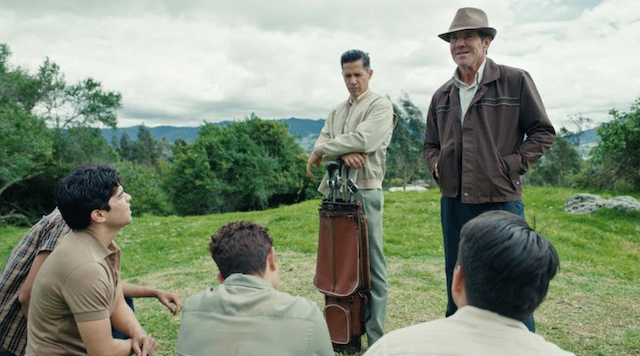
Directed by Julio Quintana and based on the novel Mustang Miracle by Humberto G. Garcia, The Long Game is a heartwarming tale of how five Mexican-American high-schoolers overcome bigotry and stereotyping to form an award-winning championship golf team with the help of a coach who refuses to give up on them. It is also a timely film at this moment in history, with the U.S.-Mexican border being such a flashpoint in the contentious debate over immigration and national identity.
Set in the border town of Del Rio, Texas in 1956, The Long Game challenges from the start the notion that golf is a game exclusively for Caucasian males. The “I Like Ike” campaign poster prominently displayed in one of the scenes is a subtle reminder that President Eisenhower frequently took a break from his White House duties for a round of golf at his country club, to say nothing of another recent President whose real-estate portfolio includes a fair share of golf courses.
Not surprisingly, the prestigious Del Rio Country Club of the 1950s was an all-white institution, except of course for the underappreciated brown-skinned caddies and groundskeepers who kept things going behind the scenes.
The Long Game also belongs in that beloved genre of films about educators who inspire their students to unlock their hidden potential. In this case, the teacher is named JB Peña, played by Jay Hernandez, an idealistic but hard-driving man who moves to Del Rio with his wife to become the new superintendent of schools. He also dreams of joining the all-white country club and is devastated when his bid for membership is rejected.
As he struggles with the fallout, however, Peña is pleasantly surprised to encounter several of his students who caddy at the club and who are so passionate about golf that they’ve built a course of their own from scratch (and sweat) so they can play the game undeterred by whites-only restrictions. Their grit and determination inspires Peña to organize the boys into a school team, the Del Rio Mustangs, who go on to win the Texas state championship.
But their journey is not a smooth one. Frustrated by the bigotry they experience, the boys sometimes act out, not always to their credit. In one scene, they trash a white-owned diner after the waitress refuses to serve them. In another, they cross the border into Mexico and get themselves involved in a barroom brawl. One of the Mustangs, a youngster named Joe (played by Julian Works) seems particularly unredeemable—a kid that would have been described as a “juvenile delinquent” in the parlance of the 1950s. But even he succumbs to JB Peña’s tough-love approach.
Kudos to Carlos Osorio and John Parker for so authentically evoking the 1950s via their set designs, which include just the right admixture of muscle cars, hairdos, and teenage fashion trends. The only glaring error in The Long Game’s visual vocabulary was the use of 50-star flags instead of the 48-star versions that remained in use until 1959 and 1960, when Alaska and Hawaii joined the Union.
But this is a minor solecism in an otherwise well-made film about the American Dream as lived on the margins. In his director’s statement, Julio Quintana declares: “As our modern world becomes increasingly cynical and divided, The Long Game reminds me of the promise that brought my parents to this country in search of a better life, and I am inspired by the example of these brave men and women who dared to believe in the American dream at a time when nobody believed in them.”
Rating: A
Check out more of Edward’s articles.

